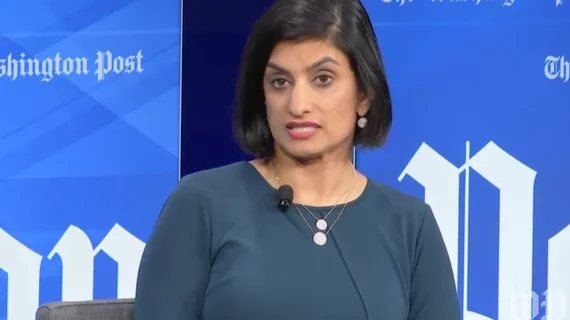CMS's Verma calls for increased interoperability—and an end to faxes
CMS and the Office of National Coordinator for Health Information Technology (ONC) are working to create a health ecosystem that allows patients to easily share their electronic health records (EHRs) with those who need them.
CMS Administrator Seema Verma, MPH, discussed the plans in a speech at the ONC Interoperability Forum on Sunday, Aug. 5, in Washington D.C. Verma said healthcare information technology continues to lag despite breakthroughs in other areas of medical technology.
Physicians are still faxing patient records, medical staff members are manually entering results into EHRs and hospitals are handing out data on CDs, Verma said, all “while the rest of the economy is functioning on fully-digitized, integrated data that informs decision-making instantaneously.”
"As we look to the future, imagine a world in which your health data follows you wherever you go and you can share it with your doctor, all at the push of a button," Verma said. "Imagine, if in turn, your doctor didn't have to spend so much time faxing records and staring at a computer during an appointment. Imagine if you could track your medical history from your birth throughout your life, aggregating information from each health visit, your claims data and the health information created every second through wearable technology."
She also said the federal government has spent more than $35 billion on an effort to get doctors to use EHRs, but the new technology has made their work more difficult. She said systems currently speak different languages and records are not interoperable, which leads to patients and providers not having access to necessary information.
"The reality is that once information is freely flowing from the patient to the provider, the advances in coordinated, value-based and patient-centric care will be even greater than anything we can imagine today," Verma said.
Verma said one of her goals with the CMS is to create a one-stop shop for health data, while challenging developers to help in the process.
"With so much data available to us, from our medical records, claims history, wearable devices and medical monitoring, we should have everything we need to make informed decisions about our health care and the cost of that care," she said.
Verma also discussed the federal agency’s Blue Button 2.0 program, a developer-friendly, standards-based application programming interface, that allows most Medicare beneficiaries to connect their claims data to third-party applications, services and research programs. The program has signed up about 600 developers.
“As patients, we demand a health IT system that is as advanced as the medical technology that saves lives. As regulators, policy-makers, developers and IT specialists, it is our charge to make that vision a reality,” Verma said.

